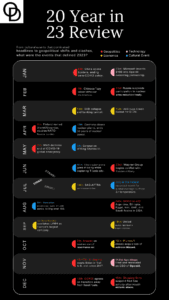As we embark on a new year, it is imperative to reflect on the monumental events that unfolded in 2023, shaping the geopolitical, technological, and socio-economic landscapes. This comprehensive overview delves into the key occurrences that defined the year, providing a detailed examination of their impact and implications for the future.

Geopolitical Landscape
Russia’s Invasion of Ukraine
The year kicked off with Russia’s invasion of Ukraine, a seismic event that sent shockwaves through global politics. This act shifted the balance of power and international relations, ushering in a multipolar environment. The repercussions of this invasion extended beyond regional borders, influencing diplomatic relations and alliances.
U.S.-China Relations
Tensions between the United States and China remained a focal point throughout 2023. As both nations vied for dominance on the global stage, issues ranging from trade disputes to technological competition underscored the complex dynamics defining their relationship. The ripple effects of these tensions reverberated across various sectors, from commerce to technology.
China’s Reopening and Geostrategic Incidents
China’s COVID Reopening
In the initial months of the year, China drew global attention as it embarked on the reopening of its borders and the relaxation of stringent COVID-19 measures. As a major manufacturing powerhouse, China’s economic activities held significant implications for the world’s post-pandemic recovery.
Spy Balloon Incident and Russia-NATO Entrenchment
However, tensions escalated in early February with the discovery of a “spy balloon” floating over the U.S. and Canada. This incident strained China-U.S. relations, coinciding with Russia’s suspension of its participation in the New START nuclear arms reduction treaty. The geopolitical landscape witnessed further shifts as Finland’s acceptance into NATO in April doubled the alliance’s border with Russia.
BRICS Expansion and Diplomatic Developments
BRICS Bloc Expansion
In a surprising move in August, the BRICS bloc announced the addition of six new members, including major oil producers Saudi Arabia, Iran, and the United Arab Emirates, alongside Egypt, Ethiopia, and Argentina. This expansion marked a significant recalibration of geopolitical relations, reshaping the dynamics within the group.
Xi Jinping’s U.S. Visit
November brought a thaw in U.S.-China relations as Xi Jinping made a historic visit to the United States, meeting with President Joe Biden. This diplomatic development hinted at potential avenues for collaboration and dialogue amid the ongoing geopolitical complexities.
Israel-Hamas War and Red Sea Shipping Attacks
Israel-Hamas Conflict
The geopolitical landscape underwent further transformation with the outbreak of the Israel-Hamas war in October. The conflict had far-reaching implications, not only affecting the immediate region but also causing disruptions to global supply chains and trade routes.
Red Sea Shipping Attacks
Simultaneously, Houthi rebel attacks on shipping lines in the Bab el-Mandeb Strait of the Red Sea raised concerns over maritime security. Low-cost drone attacks prompted major shipping firms to reroute their container ships, introducing a new dimension to security challenges in vital sea lanes.
OpenAI’s Roller Coaster Year
Technological Advancements and Governance Challenges
In the realm of technology, OpenAI experienced a dynamic year characterized by breakthroughs and challenges. Microsoft’s substantial investment and partnership extension paved the way for the launch of the GPT-4 model and significant advancements in AI technology. However, the year concluded with the unexpected firing and subsequent reinstatement of OpenAI’s CEO, Sam Altman, highlighting the governance complexities within the rapidly evolving AI industry.
The events that defined 2023 encapsulate a multifaceted narrative of geopolitical shifts, technological strides, and diplomatic intricacies. As we transition into 2024, these occurrences will continue to exert influence on global affairs, shaping the trajectory of international relations, technological innovations, and the interconnectedness of our world. Understanding the nuances of these defining moments is paramount as we navigate the challenges and opportunities that lie ahead.















